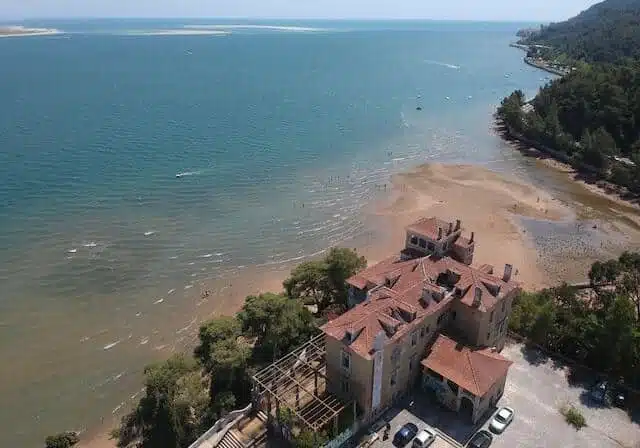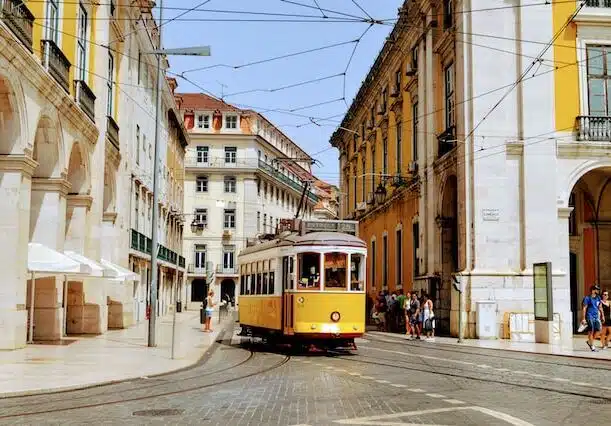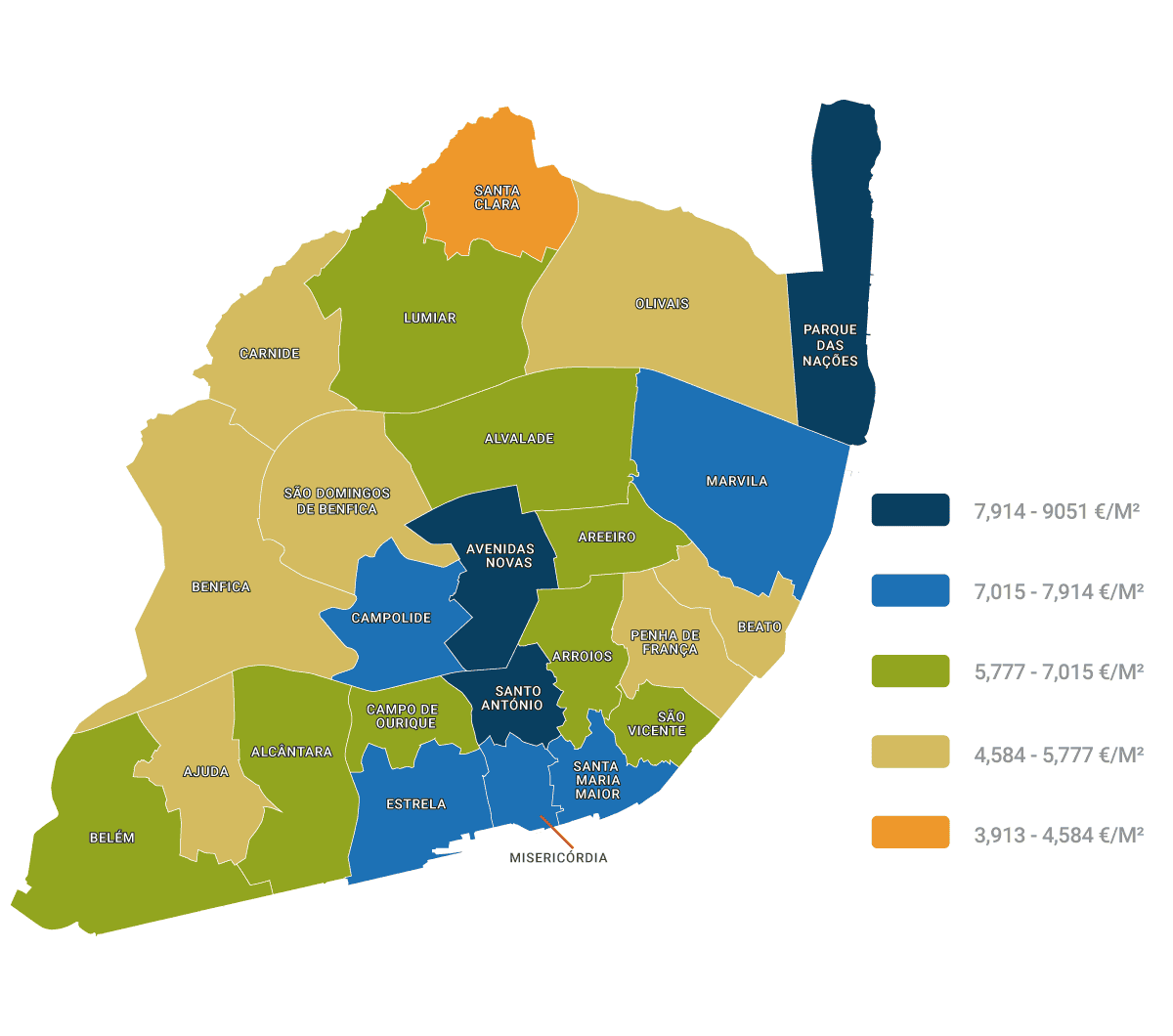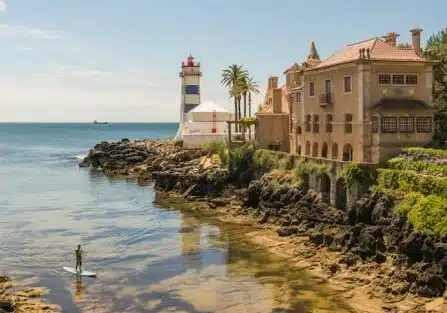Updated: June 12, 2025
Lisbon’s real estate market has moved from strength to strength over the years, becoming a home to expats from all walks of life. With vibrant neighborhoods, prime investment opportunities, and a high quality of life, Portugal’s capital has it all.
In this guide, we’ll arm you with all you need to know about Lisbon real estate. We’ll also provide key information on the best neighborhoods to consider when looking for Lisbon homes for sale and how to get the highest returns on your investment.
An Overview of Lisbon's Real Estate Market
The Portugal real estate market has solidified itself as a strong contender in the property game.
As the captivating capital, Lisbon, has proved to be a frontrunner among real estate markets worldwide.
It was named one of the top ten cities to watch for property investment in Europe in 2025, according to the Emerging Trends in Real Estate Report.
The current state of the real estate market in Lisbon, Portugal
If there is one aspect of Lisbon real estate that defines the current state of the market, it’s that demand is currently outstripping supply – and this has been the case for a while. This presents an exciting opportunity for buyers, where there is potential to secure a nice return on your investment.
The city remains relatively affordable when compared to other capital cities in Europe while still providing excellent capital appreciation. If you buy outside the city center or in up-and-coming neighborhoods, you will find the prices are even lower.
The luxury real estate market in Lisbon is also in the spotlight in 2025, ranking fourth among European cities with the greatest potential for appreciation in 2025.
Key property trends in Lisbon
Europe’s hottest real estate market, Lisbon, is ever evolving. Here are the key property trends in Lisbon driving growth right now, and making houses for sale in Lisbon, Portugal, so attractive.
Economic growth in Portugal in 2025
GDP has gradually and steadily increased over recent years and the 2025 budget bill predicts economic growth of 2.1 percent this year – more than double Europe’s overall projected growth of 0.8 percent. Meanwhile, larger economies like Germany, France, and Italy are preparing for significant budgetary tightening this year.
Tourism boom
Recent trends show that Lisbon and Porto have become increasingly popular tourist destinations, with both cities featuring frequently in travel features and recommendations for the best getaways in Europe.
In 2025, tourism is expected to increase by nine percent in Portugal, with Lisbon remaining a key player.
The city was also named the World’s Leading City Break Destination in the World Travel Awards 2024, cementing its top status as a sought-after location worldwide.
Lifestyle in Lisbon
Lisbon is famous for its laid-back lifestyle, safety, modern conveniences, and delicious food – having been crowned Europe’s Best Culinary City Destination for 2024. It boasts a great year-round climate with tons of sunny days, as well as its proximity to beautiful beaches, which are popular with surfers along the Lisbon coast.
Portugal also has one of the highest English proficiency levels in Europe and around the world. It is conveniently located in Western Europe, with frequent flights to the rest of the continent, as well as to the Americas and the rest of the world.
Government incentives
Portugal’s residency by investment scheme, known as the Portugal Golden Visa, has, in the past, been highly successful in bringing foreign investment to the country and adding value to the housing market.
Coupled with the introduction of the Digital Nomad Visa and the tax advantages for qualified expats under the new Tax Incentives for Scientific Research and Innovation program, and it’s easy to see how the Portuguese Government has made the country a welcoming place for foreign investors and expats.
Restricted supply of real estate stock
Another factor impacting real estate prices is a restricted supply of housing in the city center. Lisbon is a small and concentrated city situated next to a river. In addition, the Câmara municipal (the city regulator) limits construction in order to maintain the character of the city, and as a result, new construction projects in the historic center are virtually impossible.
Rehabilitation of older buildings is preferred and is usually the only solution for those looking to make a real estate investment in a central location.
For those looking to invest in new-build real estate in Lisbon, Portugal, there are specific areas to consider where new construction is permitted. One such area is Parque das Nações, which is particularly popular with foreign investors.
Property Prices in Lisbon
When it comes to Lisbon real estate prices, the average asking price for property in Lisbon City is €6,934 per square meter, while if you look at the Lisbon Metropolitan Area, prices stand at €4,395 per square meter. Note that, when it comes to Lisbon property for sale, the transaction price can be significantly lower than this as sellers want to sell their property by a fixed date.
In the tables below, you can see the property prices in the various Lisbon districts.
Lisbon Councils – Average Asking Price €/sqm 2024
Lisbon Neighborhood | Average Price Per Square Meter |
Ajuda | €5,366 |
Alcântara | €6,803 |
Beato | €4,896 |
Benfica | €5,123 |
Campolide | €7,125 |
Carnide | €4,784 |
Lumiar | €5,785 |
Marvila | €7,098 |
Olivais | €5,697 |
São Domingos de Benfica | €6,160 |
Alvalade | €6,235 |
Areeiro | €6,742 |
Arroios | €6,244 |
Avenidas Novas | €8,377 |
Belém | €6,757 |
Campo do Ourique | €6,974 |
Estrela | €7,694 |
Misericórdia | €7,895 |
Parque das Nações | €8,517 |
Penha de França | €4,644 |
Santa Clara | €3,977 |
Santa Maria Maior | €7,321 |
Santo António | €9,051 |
São Vicente | €6,401 |
Cascais | €7,260 |
Cascais and Estoril | €8,389 |
Carcavelos and Parede | €7,365 |
Alcabideche | €5,487 |
São Domingos de Rana | €3,841 |
Oeiras | €5,245 |
Oeiras e S Julião da barra e P Arcos | €5,934 |
Algés e Linda-a-Velha | €5,241 |
Porto Salvo | €3,956 |
Camaxide e Queijas | €4,874 |
Barcarena | €4,157 |
Investment Opportunities: Lisbon Portugal Real Estate
If you are looking into buying Lisbon, Portugal, real estate as an investment property, it can be a very lucrative venture.
While short-term rentals typically provide a better income, there is often less hassle than long-term rentals. For example, you have more consistent tenants in comparison with short-term renters, who are usually only in Lisbon for a few days.
Also, there are still restrictions in place with the issuing of new short-term rental licenses in Lisbon (the Alojamento Local license), which could prove to be challenging to navigate.
Rental yields in Lisbon
While the average rental yield in Lisbon City is 5.2 percent, some neighborhoods will prove to be a better investment option than others. For example, in Benfica, rental yields are just under six percent.
Also, if you look at the Lisbon Metropolitan Area, rental yields were higher, standing at 6.8 percent, with areas like Barreiro boasting yields as high as 7.8 percent.
Where to Buy Real Estate in Lisbon, Portugal: City Guide
If you’re considering buying Lisbon real estate for sale, then you are likely wondering what the best neighborhoods in Lisbon are. Lisbon real estate has become more popular over the last ten years, both investors and expats trading up for a sunnier and better quality of life in Portugal.
As far as places to live in Lisbon go, prices vary depending on the area of Lisbon you are interested in. We will take you through the main areas of Lisbon and what you can expect to pay for real estate in each of them.
 Real estate in Bairro Alto
Real estate in Bairro Alto
A privileged location in downtown Lisbon, Bairro Alto is one of the most popular places you can choose when purchasing property as an investor. Bairro Alto is in a central location, and as far as Lisbon areas go, it’s in the mid to high range of prices for buying Lisbon real estate.
Bairro Alto is a key tourist zone and neighbors Baixa Chiado, a high-end shopping district. Downtown Lisbon is known to attract investments in rental property.
Why invest in Bairro Alto?
Real estate in Baixa Chiado and Bairo Alto are highly prized and in great demand. The area is popular with tourists and international exchange students due to its central location and proximity to Lisbon’s premier nightlife venues. While perhaps not the best place to relocate to, this part of Lisbon is an excellent option for investors.
Average price
The average asking price for property in the Lisbon neighborhood of Bairro Alto (in the Misericórdia neighborhood) is €7,895 per square meter.
 Real estate in Lapa and Santos
Real estate in Lapa and Santos
Lapa and Santos also offer highly attractive investment opportunities, both in the tourist short-term rental market and in long-term rental possibilities, as the neighborhood has high demand from an affluent local renters’ market.
If you’re thinking of relocating to Lisbon and are looking for a quieter neighborhood or are looking to move with a family, consider Lapa and Santos. Both have fabulous parks and cafes, and there are many schools that surround the area.
Why invest in Lapa and Santos?
This emerging neighborhood has a lot to offer for families, with many charming parks to visit. Investors will find options for long-term rentals as young professionals often opt for this part of the city.
Average price
The average asking price for property in Lapa and Santos (both in the Estrela neighborhood) is €7,694 per square meter.
 Real estate in Avenidas Novas
Real estate in Avenidas Novas
Avenidas Novas is not the main touristic area of town but is still a very popular choice for real estate investment in Lisbon as it is a bustling area where locals, expats, and families live and work in the city.
It’s a green part of Lisbon, with avenues lined with trees and beautiful parks never too far away. The spacious neighborhood is also a business hub, with many company offices and coworking spaces, so you can expect to rent long-term to professionals.
Why invest in Avenidas Novas?
The buildings in the Avenidas Novas area are generally newer compared to other central areas, and they also tend to offer greater space to buyers. Many vibrant restaurants have also recently opened in this part of the city, which blends residential streets with happening bars and charming cafés.
Average price
The average asking price for property in Avenidas Novas is €8,377 per square meter.
 Real estate in Intendente and Mouraria
Real estate in Intendente and Mouraria
Intendente and Mouraria are two up-and-coming neighborhoods in Lisbon and, therefore, present an attractive opportunity to investors looking to cash in return on a sale in a few years’ time. The prices in this area are quite reasonable considering how well located the area is in Lisbon. These two adjacent, historic neighborhoods in Lisbon are primed for investment.
Intendente is known for its trendy, bohemian atmosphere, with hip cafes, coworking spaces, and trendy boutiques. Meanwhile, Mouraria – characterized by laundry hanging from the windows, strains of Fado music circling around, and street art – is undergoing a wide-reaching rehabilitation to attract new investors and residents.
Why invest in Intendente and Mouraria?
This part of the city presents an opportunity for investors. There is a short-term rental market for tourists as well as a long-term market for locals and young professionals in this hip part of town.
Average price
The average asking price for property in Intendente (in the Arroios neighborhood) is €6,244 per square meter, while the average price in Mouraria (in the Santa Maria Maior neighborhood) is €7,321 per square meter.
You can see more about this part of the city in our Intendente real estate guide.
Also, our article on Anjos real estate provides information on a charming, multi-cultural part of the city, where young professionals rub shoulders with locals and where there are countless restaurants and bars to frequent.
 Real estate in Campo de Ourique
Real estate in Campo de Ourique
Campo de Ourique is a sought-after and quiet part of town that presents more opportunities in the long-term rental market. It’s also an ideal neighborhood to relocate to with family, considering the green spaces, indoor food hall, and plethora of cafes and restaurants. The Mercado de Campo de Ourique (Campo de Ourique market) is fabulous, and the area has a very authentic, lived-in vibe.
Why invest in Campo de Ourique?
Campo de Ourique is a residential neighborhood, perfect for tenants and homebuyers looking for a quieter and more relaxed living environment while still being relatively close to the city center.
Average price
The average asking price of property in Campo de Ourique is €6,974 per square meter.
You can read more about this area in our Campo de Ourique real estate guide.
 Real estate in Alfama and Graça
Real estate in Alfama and Graça
Graça and Alfama are the oldest parts of town, situated high up with panoramic views of the city and the Tagus River from the famous miradouro look-out points. It’s no wonder that these neighborhoods are the top choice for tourists visiting Lisbon.
Why invest in Alfama and Graça?
Arguably the most authentic part of Lisbon, the winding cobbled streets and yellow trams meandering past present a clear picture of the past here. You also have stunning views of Lisbon stretched before you.
Average price
Average asking prices for Alfama and Graça (in the São Vicente neighborhood) stand at €6,401 per square meter.
You can read more about this area in our Alfama real estate guide and Graça real estate guide.
 Real estate in Belém, Ajuda, and Restelo
Real estate in Belém, Ajuda, and Restelo
These parts of town in the west of the city will have a better value per square meter, as they aren’t so centrally located in the main tourist hot-spot locations. However, for families looking to move to Lisbon, these areas have plenty of space and are still very pretty and happening neighborhoods to live in.
Why invest in Belém, Ajuda, and Restelo?
Investing in Belém, Ajuda, and Restelo can be attractive due to their historical significance, cultural attractions, and potential for urban development. This part of Lisbon offers a diverse mix of historic charm and modern amenities, making them appealing for real estate and tourism investments, with the prospect of long-term growth. You are also a little outside the city’s center, so there are more spacious properties available here.
Average price
In Ajuda, the average asking price of property is €5,366 per square meter, while in Belém and Restelo, it is a little bit more expensive at €6,757 per square meter.
 Real estate in Parque das Nações
Real estate in Parque das Nações
Parque das Nações is a re-developed, quieter part of town that presents interesting opportunities for investors with great growth potential on the investment. There are striking contemporary buildings here, and the area lines the waterfront of the Tagus River. It’s also a spacious place to move to with a family.
Why invest in Parque das Naçōes?
Investing in Parque das Nações, Lisbon, offers a modern waterfront environment with amenities like the Oceanarium and Vasco da Gama shopping center.
Sightly reminiscent of Canary Wharf in London, its appeal lies in contemporary architecture, cultural venues, and a vibrant atmosphere, with top restaurants that spill onto the streets by the river and attract residents and tourists.
Ongoing development and accessibility contribute to the neighborhood’s investment potential.
Average price
In Parque das Nações, the average asking price of property is €8,517 per square meter.
You can find out more about this neighborhood in our article on Parque das Nações Real Estate.
With so many great investment opportunities among the property for sale Lisbon offers, the real challenge as a purchaser is narrowing your search.
Note that there are many other prospective areas in the city that we have not run over in this article. This is simply because there are too many to mention. Each neighborhood will have its unique characteristics and property types, so it’s important to do your own research. You can read our ultimate guide to the best neighborhoods in Lisbon for more options.
 Real estate alternatives to the center of Lisbon
Real estate alternatives to the center of Lisbon
There are many interesting alternatives to investing in the center of Lisbon, which can make a far better investment depending on your requirements, such as if you are looking for a beach house, to live in the countryside, or close to the Lisbon coast.
Across the Tejo River from Lisbon, Almada Portugal real estate provides more affordable properties. Plus, you’ll be able to enjoy stunning views of Lisbon.
Cascais
Cascais is a seaside town a short distance from the center of Lisbon, with excellent public transportation links to the center.
Cascais boasts spacious family homes and luxurious properties for high-net-worth investors.
It is more family-friendly than the center of the city, with greater open space, beautiful beaches, and also has a number of good international schools, such as King’s College School.
Setubal

Setubal is also very close to some beautiful beaches, with very good international schools, making it a great option for families. It is close to the beautiful Sesimbra and the Arrabida Natural Park too.
To find a property in or around Setúbal, it can be a good idea to get in touch with a real estate agent in Setubal to assist you with the purchase and help you discover your dream home.
Types of Lisbon Real Estate for Sale
Buying a house in Portugal
Remember to do your research before purchasing. A quick online search for “homes for sale Lisbon Portugal” or “Lisbon apartments for sale” will help to narrow down your search. If you have specific needs, seeking expert help from professionals like a buyer’s agent is the best way to find what you’re looking for.
Residential properties for sale in Lisbon
When it comes to residential houses for sale, Lisbon offers everything from modern apartments to luxurious waterfront houses for sale in Lisbon, Portugal.
Some of the most common residential properties are: listed below.
- Apartments and condos
- Townhouses
- Villas
- Country homes
Commercial properties for sale in Lisbon
Some of the most popular investment opportunities for Lisbon commercial real estate are:
- Business offices
- Retail spaces
- Warehouses
- Tourism real estate, like boutique hotels
- Coworking spaces
Making Your Lisbon Real Estate Investment a Reality
Navigating the real estate process can be a challenge, even in our home countries. To be assured that you are paying a fair price for property in Lisbon, we would always recommend enlisting the help of a trusted real estate professional to help you through the process.
How a property’s price compares to what’s nearby, the historic prices that houses in the area have sold for, and whether the house is close to schools and amenities, should all be taken into account before investing.
A buyer’s agent or local real estate agent in Lisbon, together with a real estate lawyer in Lisbon will be able to lend a hand in this regard, with most real estate agencies in Portugal speaking English.
Goldcrest: How We Can Help
Goldcrest is a buyer’s agent that is based in Lisbon, Porto, and the Algarve. We provide expert, impartial advice on how to buy real estate in Portugal for sale. From scouting out the perfect Lisbon property for sale and guiding you through to property acquisition, we have you covered throughout the entire process and can help you achieve your property dreams.
If you are looking to find your dream home in Lisbon, don’t hesitate to get in touch.
Why choose Goldcrest?
- Local knowledge: With offices located across Portugal, our presence nationwide allows us to assist you personally across the country.
- Independent service: As an independent buying agent, we do not represent any development or project. Our service is entirely tailored toward each individual client, providing you with everything you need to secure the perfect property at the best possible price. As an impartial advisor on the market, we work solely on behalf of our client and provide a service tailored to your needs and requirements.
- Streamlined process: Our real estate agents speak English and Portuguese, and our service is completely focused on providing you with a hassle-free buying experience, saving you time.
- Experienced team: Our expert real estate team has a vast local knowledge of the real estate market. We have cutting-edge technology and metasearch tools at our disposal to provide full market coverage, ensuring the best investment choices and negotiated prices.
- Network of partners: Our network of contacts includes lawyers, Portugal property management services, builders, architects, designers, and landscape gardeners, again saving you time and hassle by providing you with trusted experts in their field of work.
Frequently Asked Questions about Real Estate in Lisbon
Why is real estate in Lisbon so expensive at the moment?
In Lisbon, demand for property has outpaced supply, driving prices up. As a popular destination for expats, the growing pool of buyers is pushing prices even higher, making it a smart time to invest before they rise further, and to benefit from capital appreciation.
Property prices vary by neighborhood, with more affordable options available in up-and-coming areas like Penha de França or outside the city center, where prices are generally lower.
Is it better to rent a home?
When it comes to real estate in Lisbon, Portugal, knowing whether to rent or buy a property can be tricky and will depend on your needs. If you look over a longer time period, buying property is better, as you can receive a steady return on your investment.
You will find an array of stunning Lisbon houses for sale to cater to whichever requirement. Nonetheless, we know that buying property is a major investment, and renting may be better suited to your current needs.
Can foreigners purchase real estate in Lisbon?
There are no restrictions on foreigners buying real estate in Portugal for sale. Therefore, when it comes to buying Lisbon real estate, foreigners can purchase property with ease and will face no restrictions. There are many different types of Lisbon, Portugal houses for sale, so you should be able to find your dream home that meets your exact requirements.
Where are the best areas to buy Lisbon Portugal real estate?
Lisbon offers a wide variety of neighborhoods to purchase real estate, each of which has its own unique vibe and characteristics. Some of the most sought-after properties in Lisbon are in Baixa, Lapa, and Campo De Ourique.
There are great opportunities for living well in these neighborhoods as well as from an investment perspective, offering promising rental yields for both long and short rentals. Estrela is a great place to buy property in Lisbon if you would like to move to the capital with your family.
Is there a property market bubble in Lisbon?
The rapid rise of property prices in the Portuguese capital has left many wondering whether there is a Lisbon real estate bubble.
While property prices in Lisbon have risen due to high demand and limited supply, there is no real estate bubble at present. A true property bubble typically involves a lack of bank financing and halted construction, neither of which is happening in Portugal. Banks are still lending, and new developments are underway.
The increase in prices is largely due to Lisbon’s growing popularity with expats and investors, alongside Portugal’s strong economic recovery and booming tourism sector. That said, smart buyers can still find good deals, especially in up-and-coming neighborhoods or areas outside the city center.
Is now a good time to invest in real estate in Lisbon?
Lisbon has proved to be a frontrunner among real estate markets worldwide, and now is the best time to invest in Lisbon real estate to take advantage of its expected growth in the years to come.
Lisbon was named one of the top ten cities to watch for property investment in Europe in 2025, according to the Emerging Trends in Real Estate Report, and the luxury property market is forecasted to be a leader in property appreciation this year.
What is the current state of Lisbon's real estate market?
The property market in Lisbon is strong at the moment, with continued high demand over the past few years, which is reflected in property prices.
What are the future predictions for Lisbon’s real estate market?
Portugal is undergoing an economic and social boom, attracting a new wave of affluent international investors, entrepreneurs, and young professionals. The dynamic Portuguese market has a wide variety of great investment opportunities and is forecast to continue on a trajectory of healthy growth in the coming years. The city of Lisbon and Portugal as a whole offer a number of tax benefits to incentivize redevelopment in historic centers.
What types of property are available in Lisbon?
Whether you are looking for single family homes for sale in Lisbon, Portugal, modern apartments, or more luxury villas, you will find a wide range of property types in the Portuguese capital. Properties in Lisbon come in all shapes and sizes, and you will first want to make a note of what you are looking for, whether it’s privacy, a villa with a pool, or a quaint historic townhouse.
Do your research, as a quick online search for “homes for sale in Lisbon Portugal” will provide you with a nice overview of what’s on offer. Then, it’s best to contact a buyer’s agent, where you’ll be able to get full market access to all properties available. They will help you find the best properties for sale in Lisbon.
You will also find a range of commercial properties and tourist properties available in Lisbon. Property types for tourist real estate include serviced apartments and hotel projects.
What are the extra costs of buying real estate in Lisbon?
Alongside the price of buying property in Lisbon, Portugal, ensure you consider these other expenses that will influence the overall cost of your property purchase in Lisbon:
- Associated taxes (such as IMT (Property Transfer Tax), IMI, and Stamp Duty)
- Portuguese mortgage fees
- Notary fees and legal fees
- Agency fees
Paying fees associated with the property purchase can add up, so make sure to factor in each additional expense to the property costs.
How can I live in Lisbon?
If you are a non-EU citizen, you will need to secure a residency permit to live in Portugal. There are many options to choose from, including the D7 Visa and the Digital Nomad Visa. After five years of legally residing in the country, you can apply for permanent residency or Portuguese citizenship. To acquire citizenship, you will need to meet all the requirements under Portuguese nationality law.
How to search for properties for sale in Lisbon?
The initial step is to do your research to get a clear picture of the real estate market. A quick online search for terms like “houses for sale Lisbon Portugal,” or “property for sale Lisbon,” will provide you with a good overview of the market.
After this, we recommend getting in touch with a real estate professional like a buyer’s agent, who will be able to discuss your needs and kickstart the search based on your requirements.
What is the average price of a home in Lisbon, Portugal?
The average asking price for property in Lisbon City is €6,934 per square meter, while if you look at the Lisbon Metropolitan Area, prices stand at €4,935 per square meter. Prices generally decrease as you move away from the city’s center.
Are there any specific areas in Lisbon that are more desirable for real estate investment?
Desirable areas for real estate investment in Lisbon include Chiado, Baixa, and Alfama, known for their historical charm and high demand. Marvila, an up-and-coming area of the city, could also be a good option.
What are the legal requirements for purchasing real estate in Lisbon as a foreigner?
Foreigners buying property in Lisbon will face no restrictions but will need to obtain a Portuguese tax identification number (NIF number in Portugal), and it is recommended that they open a Portuguese bank account to minimize transaction costs.
How does the buying process work for real estate in Lisbon?
The buying process in Lisbon involves finding the perfect property, making an offer, negotiating terms, conducting due diligence, signing a preliminary contract, and completing and signing the final deed at a Notary.
Are there tax implications for foreign buyers purchasing real estate in Lisbon?
Yes, you will be required to pay taxes both at the time of purchase and on an annual basis. Taxes that you will need to pay at the time of purchase include Property Purchase Tax (IMT), Municipal Property Tax (IMI), and potentially Portuguese Wealth Tax Additional to IMI Tax (AIMI), if your property is valued above €600,000.
What financing options are available for purchasing a house in Lisbon?
There are more than fifteen banks offering mortgages to foreigners in Portugal, including BCP Millennium, Bankinter, Santander, and Banco CTT. See our full guide to getting a mortgage in Portugal for the exact process and expert advice.
How can I find a reliable real estate agent in Lisbon?
The best way to find a trusted real estate agent is to seek recommendations from friends and family or look into companies’ testimonials and reviews. Bear in mind that real estate agents work on behalf of the seller and will get a higher commission for a higher sale. As such, it can be a good idea to work with a buyer’s agent like Goldcrest, who works solely on behalf of the buyer, ensuring your needs are met and your interests are protected.
Are there any incentives or programs available for first-time home buyers in Lisbon?
The First Home Scheme, a partnership between the government and participating banks, is a shared equity scheme that aims to help first-time buyers cover the cost between their deposit and mortgage, and the price of their new home.



